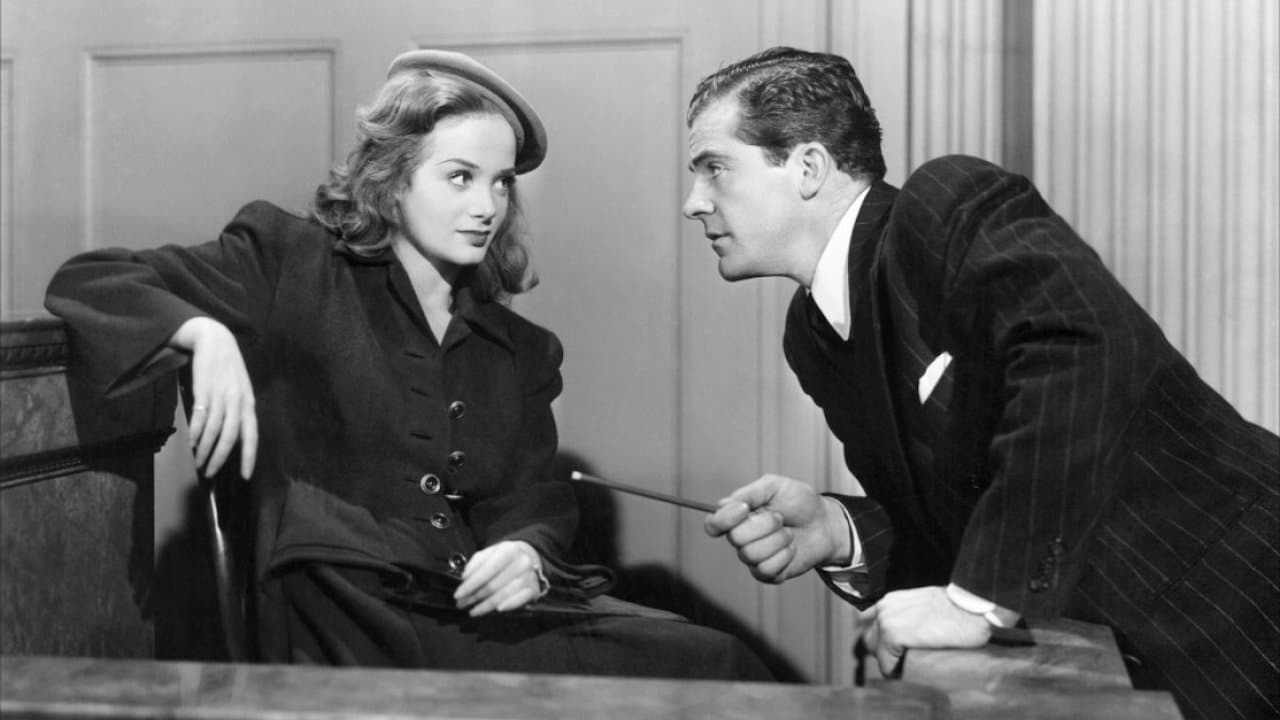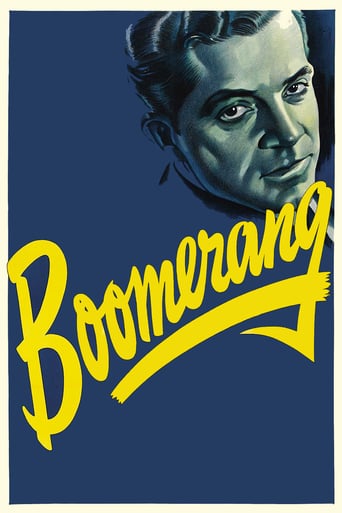



the leading man is my tpye
Deeper than the descriptions
A Major Disappointment
It's a good bad... and worth a popcorn matinée. While it's easy to lament what could have been...
View MoreA beloved Protestant Episcopal minister, Father George Lambert (Wyrley Birch), is shot to death at night while lighting his pipe on a city street. A man in a white hat and a dark trench coat runs away. In brief flashback we see several kooks who may be the murderer. After many days there is no break in the case as the political pressure intensifies and the local citizen's committee demands action. State Attorney Henry Harvey (Dana Andrews) and Police Chief Robbie Robinson (Lee J. Cobb) feel the heat. Police Commissioner James (Ben Lackland) perturbs Robinson, who threatens to quit. There are also those politicians who want Harvey to look badly. Trying to ridicule the reform administration currently in power, the local newspaper ("Morning Record") screams a headline: "Report Police Dept. Under Fire From State House." The same newspaper runs editorial cartoons about the blind leading the blind. Finally a vagrant who possibly matches a sketchy description is picked up in Ohio and extradited to Connecticut. He is identified in a police line-up by several witnesses. Under an intense and grueling two-day interrogation by such folks as Detective Lt. White (Karl Malden), the man (John Waldron = Arthur Kennedy) cracks and confesses to the crime. Ballistics tests say that the bullet lodged in Father Lambert's brain came from Waldron's handgun. It appears to be an open and shut case.But when Harvey speaks to Waldron behind bars, he begins to have doubts about Waldron's guilt, even though the suspect is angry and unstable (and, as we have seen, had an altercation with the priest earlier). Harvey remembers the Lawyers' Code of Ethics that justice is more important than conviction. Consequently, at the indictment hearing, although the state attorney lays out a course that appears leading to a deposition of guilt, Harvey in fact states that the suspect is innocent ("nolle prosequi"). The courtroom erupts, immeasurably displeasing the judge, who is also unhappy with Harvey, as is Robinson. The judge, believing that Harvey is being pressured by political chicanery, warns about possible malfeasance and disbarment. Harvey is risking his reputation. There is another angle. Paul Harris (Ed Begley) wants a conviction so that his party will be assured of an election victory. Harris owns the Sunset Realty Company, which is trying to sell ten acres of land to the city for the charitable Project for Recreational Center (for children). If his party does not win the election, the city will not approve of the purchase and Harris will be financially ruined. Complicating matters is that Harvey's dutiful (and attractive) wife, Madge (Jane Wyatt) is an altruistic volunteer Chairman of the Project. Although she is not privy to the schemes of Harris, he threatens to implicate her; it will look bad in the newspapers. Harris even pulls out a handgun and threatens Harvey (Yikes, only in Hollywood!). On the second day of the indictment session, Harvey requests that he call in witnesses, not prohibited but unusual. He shows the inconsistencies of the statements of the witnesses, with at least one with an agenda. Harvey also demonstrates that the police ballistics testing was incorrect. Seeing his ruin, Harris takes out his handgun and commits suicide. Case dismissed. The newspaper reads: "Waldron Freed" and "Harvey Exonerates Murder Suspect." Meanwhile a possible suspect perishes in an automobile crash. By the way, the case was never solved.The movie was based upon the murder of a popular Catholic priest (not a Protestant minister), Father Hubert Dahme, in 1924 in Bridgeport, Connecticut. That case too was never solved. As Bridgeport would not cooperate with filming, the movie was shot in nearby Stamford. It is interesting to note that the state attorney (Homer Cummings, a Democrat) on that case became the nation's attorney general in the Roosevelt Administration. Ably directed by Elia Kazan, this realistic and hard-hitting drama is one of the best films of the year. Dana Andrews, an intense actor, stars as a lawman with a deep conscience. Jane Wyatt, whose career began in the 1930s, would later star (as Margaret Anderson) with Robert Young in the popular "Father Knows Best" TV series (1954-1960). Top portrayals were also delivered by proved performers Arthur Kennedy, Lee J. Cobb, Ed Begley, and Karl Malden.
View MoreThe real-life unsolved murder of a popular priest in Bridgeport, Connecticut, provides the factual basis for this intriguing crime drama in which political corruption, dubious police practices and outrageous abuses of power, figure strongly. In typical docu-noir style, most of the action is filmed on location with non-professional actors filling the supporting roles and an authoritative newsreel-style narration providing important background information. The overall mood of the piece is rather uneasy and becomes increasingly tense as the stakes get higher and the trial of the prime suspect approaches.After the brutal murder of Bridgeport's local priest, State Attorney Henry L Harvey (Dana Andrews) and local Police Chief Robbie Robinson (Lee J Cobb) come under immediate pressure to find the culprit and bring him to justice. As the days pass and the police investigation fails to identify a suspect, the criticism from the local newspaper, the public and local politicians becomes increasingly intense. A breakthrough then seems to be made when a man, fitting the description of the killer, is located and brought in for questioning. The circumstantial evidence against unemployed ex-G.I. John Waldron (Arthur Kennedy) seems compelling and so when he provides a confession, the case appears to have been solved. A problem arises however, when Harvey starts to have doubts about Waldron's guilt and realises that if he doesn't forcefully pursue a conviction, he will have to face the opposition of everyone in Bridgeport and also risk his own career in the process.What becomes most apparent from the situation is that everyone in the locality is so driven by self-interest or a need for revenge that they're totally unconcerned about the pursuit of justice or the fate of the World War 11 veteran who could possibly be innocent. The proprietor of the local newspaper (an opponent of the ruling Reform Party) had accused the police department of incompetence and added fuel to the public's sense of outrage in the early stages of the investigation because an election was looming. Similarly, in order to try to ensure victory at the upcoming election, the Mayor made it clear to Harvey that a conviction would make it a certainty that he'd achieve his long-held ambition to become the State Governor.Another Reform Party official, Paul Harris (Ed Begley), is the owner of a company that owns some land which the current administration is due to purchase for the creation of a recreation area. If his party don't get re-elected, he knows the project will be abandoned and he will be financially ruined. He therefore puts pressure on Harvey to smooth the Party's way back into power by getting a conviction and adds that if Harvey doesn't comply, he will expose the fact that Harvey's wife Madge (Jane Wyatt) had lent him some money for the project and make her appear to be corrupt.When the police interviewed Waldron, they denied him access to a lawyer and after considering beating a confession out of him went on to achieve their objective by using sleep deprivation instead. The public need for revenge had become so intense that they'd moved into lynch-mob mode and the various witnesses in the case also became willing to perjure themselves in order to ensure that someone paid heavily for the death of the priest.The movie's opening narration emphasises how typical Bridgeport is of towns all over the United States and no doubt, this must've provided some food for thought amongst audiences at the time of the movie's original release. "Boomerang!" is an intelligent movie that's well made and contains an array of fine performances, most notably by Lee J Cobb, Arthur Kennedy and Dana Andrews who looks convincingly stoical as he tries to ensure that justice is done in extremely difficult circumstances.
View MoreBoomerang! is one of producer Daryl F. Zanuck's semi-documentary films from the late 1940s. It is not the first time he has made a motion picture that was inspired by a magazine article. In this case, the article was published in The Reader's Digest and is based on a true story.The story is simple. Dana Andrews plays a prosecuting attorney who does a 180 and decides that the man he should convict is, in fact, innocent. The film leaves the audience hanging with the idea that Andrews may have been wrong, even after 'justice' has been doled out.But beyond the headlines and the courtroom theatrics, there is a larger story here. Director Elia Kazan clues the audience in on the powerful behind-the-scenes maneuvering of city politicians whose aim it is to use the trial to placate voters.
View MoreThe picture was based on a case involving Homer S. Cummings, a former Mayor of Stamford, CT and one our greatest Attorney-Generals. He served under FDR in the 1930's and created a strong criminal justice arm of the Department of Justice. I saw the film more than 50 years ago and watched it again the other evening on Turner Classic movies. The cast is excellent and I had the distinct pleasure of meeting Dana Andrews when he visited Boston University in the mid 1960's. He was always a very serious actor and was wonderful in "The Best years of Our Lives," and "Laura."Richard J. Garfunkel Host of the Advocates WVOX 1460 am radio New Rochelle, NY
View More